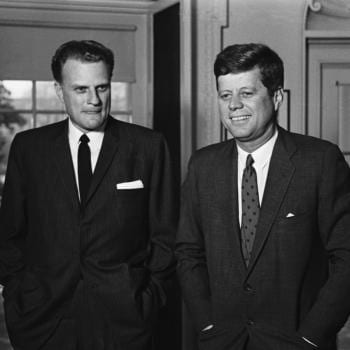A lot of stuff in this world needs constant monitoring. Especially in church circles, not everything winds up going well. The evidence mounts daily that fundamentalists were right to be worried. Something can (did) go wrong.
For instance, Rod Dreher, the author of The Benedict Option, regularly posts reflections of his readers about his proposal that Christians can no longer depend on regular institutions and associations to pass on religious norms. Here is one Protestant’s lament:
I serve a relatively conservative congregation in historic relation to a mainline Protestant tradition, and I’m our area’s designated “historian” on matters of polity & ecclesiology. . . .
What our community (local church, state, wider tradition) has in common with much of the mainline Protestant family is less the apostasy that I know folks here like to point to, than the fact that for many of our congregations, Christianity and membership in a local church was a form of social aspiration. Trying to move up from poverty and rural isolation and little or no property to owning land, a house, and a salaried job — these were the underpinnings of what it meant to be “part of the church” a century and change ago. Cleanliness being next to godliness, and a steady income with some savings tucked away a sign of divine favor, was all part of a cultural Calvinism that included dressing nicely for going to baseball games in the 30s and flying in the 60s. It was a middle-brow appreciation for “The Lost Chord” and “The Holy City” in music and popular prints in our homes and Sunday school classrooms, Warner Sallman prints in our Bibles and a “Head of Christ” in the auditorium, “Great Books” on the shelves and newspapers piling up next to Dad’s chair, under the table with his pipe.
Such cultural forms of Christian observance are also a problem for Roman Catholics:
… notice how few bishops seem interested in the Liturgy as a force for cultural change. In my own archdiocese, there is almost no central coordination or even concern on that point — far more effort is spent on clarifying ideas by publishing documents that no one reads, as well as furtively remonstrating in social media, posting videos with views in the mere hundreds. Meanwhile, as the numbers of Catholics in the pews declines at 3% every year, the few left take their cues from mainstream culture, and their experience of Sunday Mass remains a minimalistic affair of compromise, with little beauty or ritual: a mostly spoken denuded 60 minute sleepwalk, with hymns from the 1970s (still!), inside churches built or renovated in the 1960s. The exceptions only prove the rule.
This kind of drift may be more surprising among Roman Catholics since Pius X condemned modernism even before the fundamentalist controversy of Protestants. So you might expect folks in the Roman communion to be on guard against departures from the straight and narrow.
Rod Dreher offers his on perspective in another post and there questions the policies of Pope Francis:
The problem is that in today’s world, far too many churches and Christian individuals have lost the knowledge of what it means to be a Christian. This is why sociologist Christian Smith’s findings that the overwhelming number of US Christians believe in a pseudo-Christianity he calls Moralistic Therapeutic Deism is so important — and so catastrophic to the present and future of the faith. Christianity is not whatever people who call themselves Christians happen to believe. That is MTD. That is emotivism. You cannot authentically disciple people who believe there is no truth beyond themselves to which they should conform. What many, many Catholics and other Christians think of the faith has been conditioned by liquid modernity: it is always changing to fit the felt needs of the time.
Dreher also quotes Christian Smith on how liquid modernity is affecting Protestants as well as Roman Catholics:
Many parents come from a generation that has bent over backwards not to ‘shove anything down anyone’s throat.’ Consequently, their kids aren’t getting much direct theological substance to embrace, revise, or reject. If so, that’s a real disservice to kids.
My sense is that most youth ministers are knocking themselves out to do their best. Many also tell me they’re under pressure from all sides to entertain their teenagers, which isn’t a great context for sustained, solid teaching in faith. But for whatever reasons, the bottom line is that the majority of teenagers, including many evangelicals, turn out to be pretty clueless and inarticulate about their own faith perspectives.
Funny how fundamentalists were worried precisely about a vacuous, moralistic faith a century ago. But did anyone take them seriously? Nah. They were simply mean, backward, and intellectually challenged.
Who knew they might have been on to something?












